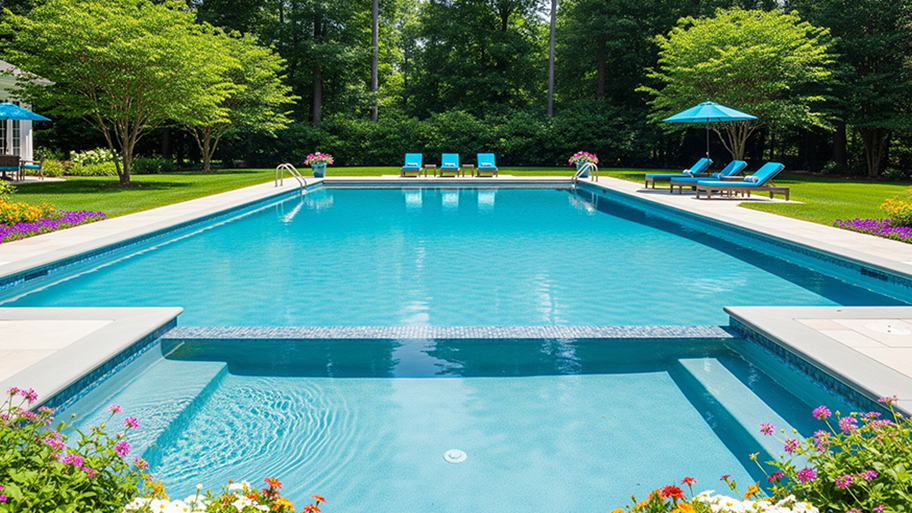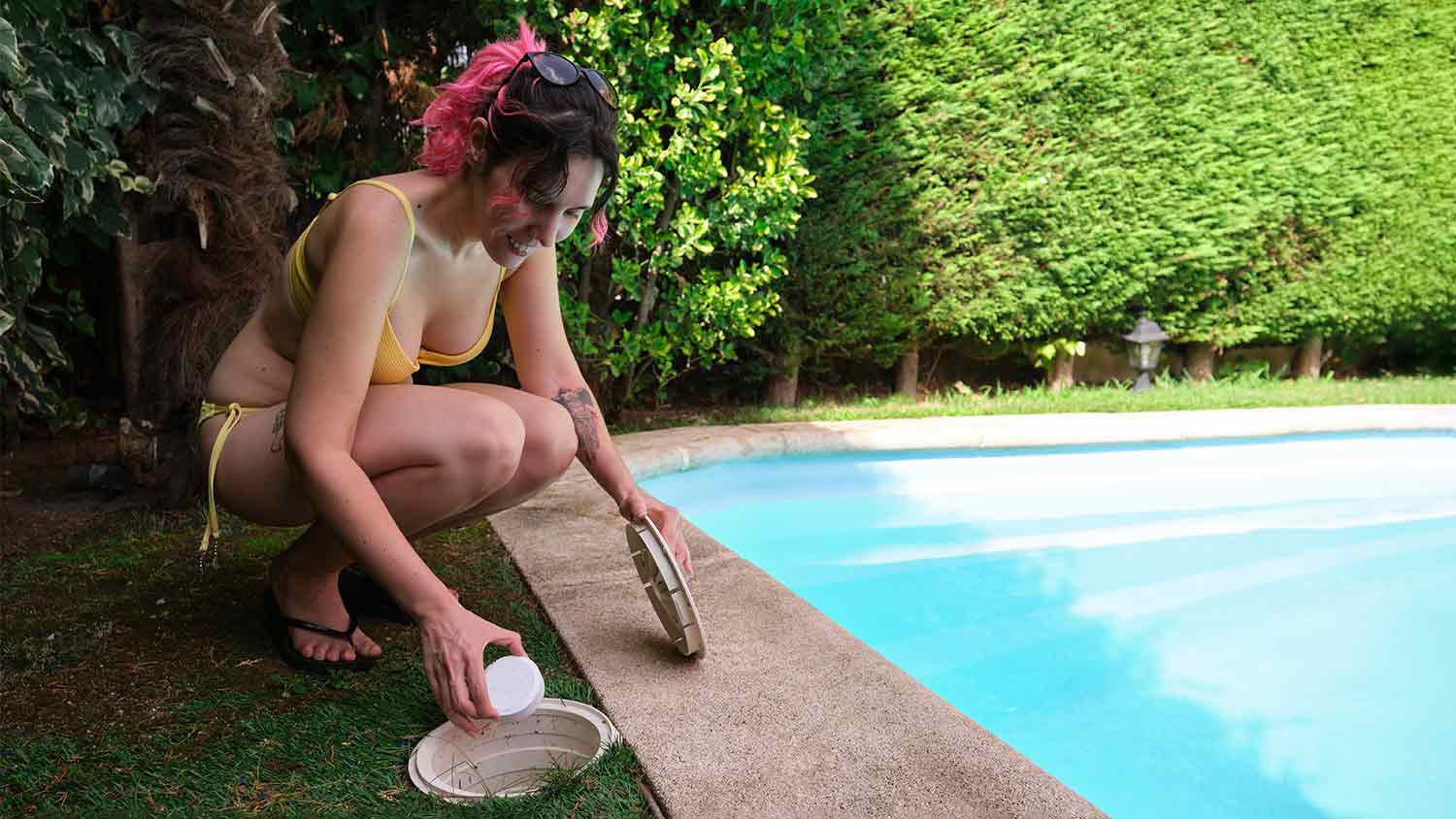
When murky waters and slimy surfaces get in the way of your pool parties, it may be time to consider the cost to acid wash a pool. Refresh your pool by bringing in the pros.
Splish and splash with peace of mind this summer


Pool bonding protects users against shock and electrocution.
Bonding connects all conductive parts of the pool.
Grounding directs electrical currents toward the ground.
Pool bonding and grounding require a professional electrician.
While swimming and splashing in a pool is a fun way to unwind, safety measures are necessary to protect your summer swimmers. Some homeowners may not realize that pools come with the risk of electrocution. That’s why pool bonding and grounding are essential when installing your pool. Here’s everything you need to know about keeping your family safe with pool bonding and grounding.
Pool bonding, or equipotential bonding, refers to creating an equal, balanced level of electrical potential among all conductive parts of a pool by using pool bonding wire to build a low-impedance pathway between these electrical and metallic parts.
In more basic terms, pool bonding helps minimize electrical voltage shocks that could harm swimmers or those walking around the pool. It’s an element of pool safety you can’t ignore.

Every conductive element needs to be bonded. This includes the metal ladder you use to get in and out of the pool, the frame around the pool, and any electrical components, like filters and heat pumps.
An electrician will use copper wire, bonding lugs, a pool bond, and a bonding grid to create a complete, non-impedance pathway to equalize voltage across all the electrical and metallic parts of the pool.
When bonding a pool, the electrician will use several parts to complete the bonded system and connect all the conductive elements.
Bonding lugs: The bonding lugs connect all the conductive elements with copper wire running throughout the bonded system.
Copper wire: Pool bonding requires at least 8-gauge copper wire to connect conductive elements and will connect to each component with the bonding lugs.
Pool bond: This part is installed near the pool filter. It includes a metal plate inside and a copper wire.
Skimmer bonding kit: This kit attaches to the skimmer to bond the pool water.
Bonding grid: This metallic grid is installed around the pool and deck to create an equipotential plane that can bond all conductive parts of the pool.

Like bonding, grounding is essential for keeping the pool and surrounding area safe. Pool grounding involves connecting the bonded pool system to the ground as an added precaution against excess electrical currents. The grounding will direct the electrical currents to the ground, away from the pool or people and animals nearby.
Pool bonding and pool grounding are often confused with one another. However, with pool grounding, the goal is to direct the electrical current toward the ground. This will keep excess electricity from shocking people or pets in or around the pool.
To ground a pool, an electrician connects the pool equipment to the electrical panel, which supplies power. This system then connects to the ground through a ground-fault circuit interrupter (GFCI) breaker. Excess electrical currents flow toward the GFCI breaker rather than toward anyone in the pool, and the breaker cuts the power.
Once an electrician bonds the pool, they can start working on grounding the system. This process requires more copper wire as well as the GFCI breaker.
GFCI breaker: This element directs excess electricity to the ground and cuts power to malfunctioning elements that are shorting or faulting.
Copper wire: Grounding a pool will require an 8- to 12-gauge copper pool bonding wire to connect electrical components and the electrical panel to the breaker.
Electrical work for a pool costs about $500 to $1,500, and bonding and grounding will cost around $200 to $300 for four to six bonding points and two grounding rods.
Pool bonding and grounding may be a more expensive part of the budget for the cost of an in-ground pool compared to the cost of an aboveground pool, but both pool types will require permits and professional labor costs.
Whether you’ve installed an in-ground pool with the help of an in-ground pool installation company near you or decided on a DIY setup with a smaller, aboveground pool, all pools require bonding and grounding to prevent the risk of electrocution.
Even pools with vinyl liners or tile must be bonded and grounded since electrical components or metal frames can all act as electrical conductors. If you’re doing extensive repairs or additions to the pool, you may need to contact a pool repair service and hire a local electrician to ensure the bonding and grounding system remains intact. Each conductive element needs to be connected in a system via bonding. Then, the pathway needs to be directed toward the ground. This will help direct and dissipate electrical currents to prevent shocks.
While pool owners might be able to find DIY pool bonding kits for $20 to $100, it’s best to leave this type of work to a professional electrician. The bonding and grounding needs to meet the National Fire Protection Association (NFPA) 70 National Electric Code. Also, many municipalities require licensed electricians to complete pool bonding and grounding.
Your electrician will ensure your pool bonding and grounding is up to code. This is necessary for all pool types since an unbonded or improperly bonded pool can increase the risk of electrocution.
Homeowners should steer clear of DIY electrical repairs or installations, as the risk of injury is shockingly high! Instead, hire a local electrician who has the expertise to complete electrical jobs safely.
Once the pool is installed, you’re probably eager to jump in or float along the cool water. While you’ll want to account for a couple of hours to a few days for pool bonding and grounding, depending on the pool size, you’ll also need to consider the time to apply for and secure permits and complete inspections.
Electrical work for pools typically requires permits, which can take a few days to a few weeks to obtain. The work must be inspected once an electrician has bonded and grounded the pool.
From average costs to expert advice, get all the answers you need to get your job done.

When murky waters and slimy surfaces get in the way of your pool parties, it may be time to consider the cost to acid wash a pool. Refresh your pool by bringing in the pros.

When you're long overdue for a pool upgrade, how much does a pool remodel cost? From a new finish to a whole new design, we'll break down your options here.

Semi-inground pools offer a nice balance of convenience and affordability. Use this guide to estimate semi-inground pool costs to transform your backyard.

Learning how to drain a pool is just as important as all the other upkeep tips you've gathered along the way. Here's a step-by-step DIY guide.

Baking soda is a budget-friendly way to tackle DIY pool maintenance. Our guide explains how to add baking soda to a pool.

Our chlorine calculator helps you determine the exact amount of chlorine to add to your pool, based on its volume and your desired parts per million (ppm) level.